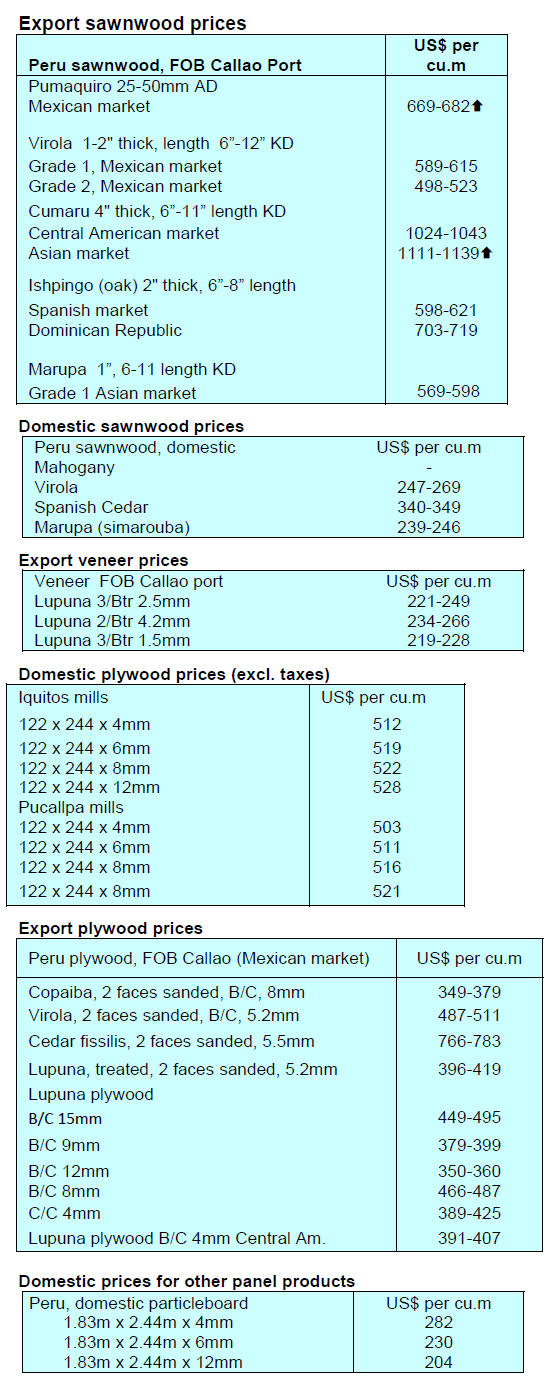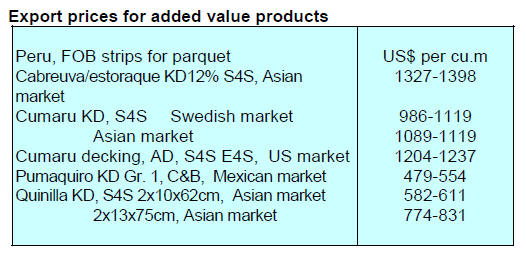4.
INDONESIA
Indonesian economy records growth
During a press conference on the Indonesian State Budget
Finance Minister, Sri Mulyani Indrawati, said economic
growth up to the third quarter of 2021 was 3.1%
approaching the government’s forecast of 3.7% to 4.5%
for the year.
SVLK promotion needs to be intensified
Indroyono Soesilo, chairman of the Association of
Indonesian Forest Concessionaires (APHI), said intensive
promotion is needed to encourage global market
acceptance of the Timber Legality Verification System
(SVLK) applied in Indonesia.
He said that Indonesia had proposed Ambassador Yuri O.
Thamrin as Executive Director of the International
Tropical Timber Organization (ITTO) which, he added
can contribute to the promotion of sustainable wood
products such those from Indonesia.
See:
https://www.antaranews.com/berita/2505549/aphi-promosiperlu-digencarkan-untuk-mendorong-keberterimaan-svlk
Indonesia exports more to US and China than EU
The Indonesian Ambassador to the European Union, Andri
Hadi, said demand for Indonesian wood products in the
European Union is less than that to the United States and
China even though Indonesia has adopted the Forest Law
Enforcement Governance and Trade (FLEGT) scheme
which aims to promote Indonesian products in the EU.
According to him Article 13 of the VPA between
Indonesia and the EU which regulates market incentives
has not been implemented by a number of EU member
states.
In response Patrick Child, speaking for the European
Commission, said that with the recognition of the Timber
Legality Verification System (SVLK) as a FLEGT license
Indonesian wood products can more easily enter the EU
market but the impact does need to be optimised.
He said the European Union wll continue cooperating with
Indonesia for the benefit of both parties regarding FLEGT
including the issue of applying due diligence on wood
products that do not have a FLEGT license.
See:
https://www.antaranews.com/berita/2505525/produk-kayuri-ke-eu-di-bawah-as-dan-china-meski-ada-skema-flegt
and
https://www.borneonews.co.id/berita/242620-produk-kayu-ri-keuni-eropa-di-bawah-as-dan-china-meski-ada-skema-flegt
In related news, Indonesia has indicated will take action if
the European Union and UK do not consistently apply the
Forest Law Enforcement, Governance and Trade (FLEGT)
regulation.
The Director General of Sustainable Forest Management
of Ministry of Environment and Forestry (KLHK), Agus
Justianto, in a statement at COP26 said "Our SVLK has
obtained a FLEGT license but the European Union is not
consistent in applying the FLEGT license system.
See:
https://www.msn.com/id-id/berita/nasional/dari-cop26-glasgow-dirjen-agus-justianto-uni-eropa-harus-konsisten-atasimplementasi-lisensi-flegt/ar-AAQtRRT?li=AAuZNMP
and
https://m.tribunnews.com/nasional/2021/11/09/dari-cop26-glasgow-dirjen-agus-justianto-uni-eropa-harus-konsisten-atasimplementasi-lisensi-flegt
SLVK a reference for sustainable commodities
The Ministry of Environment and Forestry (KLHK) said
Indonesia's Timber Legality Verification System (SVLK)
could be a reference point in efforts to promote the global
trade in certified sustainable commodities.
The Director General of Sustainable Forest Management
at the Ministry of Environment and Forestry, Agus
Justianto, said an accountable verification system that
involves multi-stakeholders along with incentives are an
option to promote trade in agricultural commodities under
the Forest, Agriculture and Commodity Trade (FACT)
Dialogue scheme.
The FACT Dialogue is a forum for a number of countries
that aims to promote trade in sustainable agricultural,
forestry and commodity products to control deforestation
and protect forests. Indonesia and the UK are co-chairs of
the FACT Dialogue which accommodates the key
producers and consumers of commodities, such as beef,
soybeans and palm oil.
Simon Sharpe, Senior Adviser - Forest Governance,
Markets and Climate (FGMC) Programme Department for
Environment Food and Rural Affairs (DEFRA) UK, is
reported to have said based on the experience of FLEGT
and SVLK Indonesia market acceptance of certified
sustainable products is still low.
See:
https://www.antaranews.com/berita/2511849/klhk-slvk-jadirujukan-bagi-promosi-komoditas-bersertifikat-lestari
and
https://investor.id/business/270187/promosi-komoditas-lestaribisa-tiru-svlk-indonesia
Innovative and sustainable Lightwood – opportunities
in international markets
Setyo Wisnu Broto, chairman of the Indonesian
Lightwood Association (ILWA) has reported export
demand for wood commodities began to increase in line
with the recovery of the global economy. He said that at
the beginning of the pandemic demand for wood in export
markets fell by around 70% compared pre- pandemic
levels.
He said demand for plywood products to the United States
is currently very strong and demand in the EU markets is
also starting to rise.
However, currently exporters are facing problems due to
the scarcity of containers for shipping lightwood to some
countries. Break-bulk shipping has been tried but this is
only successful in the US said the ILWA chairman.
https://surakarta.suara.com/read/2021/11/02/201334/pandemi-covid-19-yang-berangsur-membaik-berdampak-positifke-pasar-kayu-ringan?page=2
In related news the Director General of National Export
Development, Didi Sumedi, said the Ministry of Trade is
committed to support the production and innovative
marketing of sustainable lightwood products. Through the
lightwood trade Indonesia can change its image from a
tropical wood producer to an innovative and sustainable
timber producer.
Didi gave five reasons why Indonesia's lightwood offers a
great opportunity.
First, through the SVLK, Indonesia is the only
country with the timber legality verification
system accepted by the EU FLEGT which makes
Indonesian light wood products more attractive to
consumers in European countries.
Second, the Indonesian timber industry has
moved from natural forest harvesting to
plantations.
Third, Indonesia has pioneer companies that are
able to produce innovative light wood products.
Fourth, light wood production supports the rural
economy through providing employment and
lightwood growing and sales.
Fifth, sengon and jabon (lightwood species) can
grow quickly and can be harvested within five
years.
The development of lightwood has received a boost
through cooperation between three international
organisations namely the Swiss Import Promotion
Program (SIPPO) and Fairventures Worldwide and the
German Import Promotion Program (IPD) which will
assist with the development of lightwood growing and
product development.
See:
https://pressrelease.kontan.co.id/release/kemendag-5-faktorjadikan-indonesia-lokomotif-kayu-ringaninovatif-berkelanjutandi-pasar-global?page=2
Carbon trading regulation adopted
Indonesia has passed a much-anticipated regulation that
sets a price on carbon emissions and creates a mechanism
to trade carbon. Details of Indonesia's regulation are not
yet available but based on its draft companies will be
allowed to sell carbon units if they comply with the
reporting and recording procedures for inclusion under the
Environment and Forestry Ministry's national registry.
Carbon trading will be done through a bourse in Indonesia
and levies will be charged on transactions.
See:
https://nasional.kontan.co.id/news/pemerintah-klaimcarbon-pricing-dan-pajak-karbon-bisa-tingkatkan-investasi
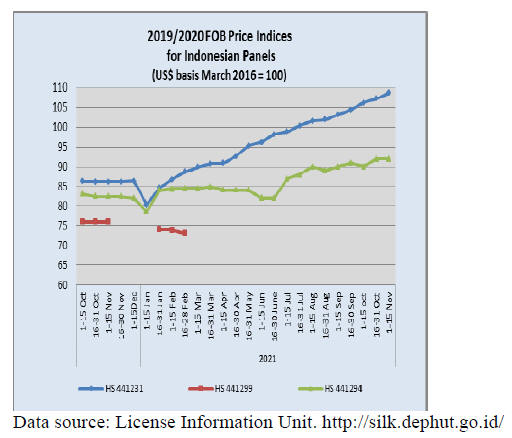
5.
MYANMAR
Security Council Press Statement on
Myanmar
The UN Security Council issued a press statement which
says “The members of the Security Council expressed
deep concern at further recent violence across
Myanmar. They called for an immediate cessation of
violence and to ensure the safety of civilians. The
members of the Security Council underlined the
importance of steps to improve the health and
humanitarian situation in Myanmar, including to facilitate
the equitable, safe and unhindered delivery and
distribution of COVID-19 vaccines.
They called for full, safe and unhindered humanitarian
access to all people in need, and for the full protection,
safety and security of humanitarian and medical
personnel. They underlined that vaccines should be
accessible to all and called for greater international
support to ensure the availability of COVID-19 vaccines
and to expedite their roll out.
The members of the Security Council reiterated their full
support for the Association of Southeast Asian Nations’
(ASEAN) positive and constructive role in facilitating a
peaceful solution in the interest of the people of Myanmar
and their livelihoods. The members of the Security
Council reiterated their calls for the swift and full
implementation of ASEAN’s Five Point Consensus”.
See:
https://www.un.org/press/en/2021/sc14697.doc.htm
Foreign Investment
According to the local media the Yangon Region
Investment Committee approved investments by two
foreign enterprises and two domestic businesses in the
manufacturing sector with an estimated capital of US$6.1
million and K8.64 billion respectively. This investment is
expected tp generate over 2,500 jobs.To simplify the
verification of investment projects, the Myanmar
Investment Law allows Regional and state Investment
Committees to grant permission for local and foreign
proposals where the initial investment does not exceed K6
billion (around US$5 million).
Central Bank of Myanmar sells more dollars
The Central Bank of Myanmar (CBM) sold US$294.8
million at its auction rate to authorised dealers in the past
eight months (Feb-Sept) 2021 according to auction
statistics.
In a bid to stabilise the local currency and control market
volatility the CBM reportedly sold about US$6.8 million
on 3 February 2021, US$12 million in April, US$24
million in May, US$12 million in June, US$39 million in
July and US$28 million in August. The current political
situation in the country means people want to hold hard
currency.
In related news after the Central Bank of Myanmar
tightened the dollar exchange rate to between 0.5% of its
reference rate by an order issued on 9 November the dollar
rate against Myanmar Kyat dropped to MMK 1,778 per
dollar.
To further strengthen the Myanmar Kyat against the US
dollar the Central Bank has reduced the margin of the
reference rate to 0.5 % from 0.8 %.The Central Bank of
Myanmar has been pumping hundreds of millions of dollar
to in an efforts to strengthened the value of the Myanmar
Kyat.
See:
https://mmbiztoday.com/dollar-rate-eases-after-centralbank-tightens-reference-rate/
)
Alternate reality -Tourism to reopen
According to the World Travel & Tourism Council in
2019 international tourism contributed about 6% to
Myanmar’s GDP. Last month the Minister for Hotels and
Tourism, Htay Aung, said the administration is finalising
plans to reopening the tourism sector to foreigners early
next year.
This move comes as the pace of COVID-19 infections has
dropped sharply. Htay Aung said although half of the
country’s hotels and guest houses have suspended
operations some 90,000 rooms are still available.
See:
https://www.mizzima.com/article/myanmar-preparescautiously-open-tourists
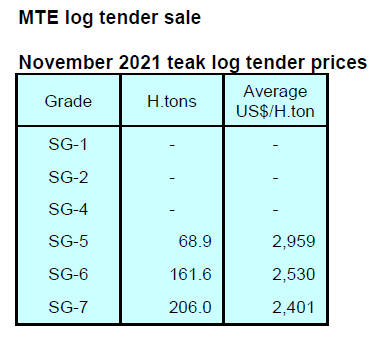
6. INDIA
Wood product price
indices unmoved despite high
inflation
The Ministry of Commerce and Industry has reported the
official Wholesale Price Index for ‘All Commodities’
(Base: 2011-12=100) for September 2021 increased to
133.8 from 133.0 in August.
The index for manufactured products which account for
almost 65% of the overall index increased to 136.0 in
September 2021 from 135.9 for August 2021. Out of the
22 groups of manufactured products 17 saw increased
prices; 4 groups witnessed a decline and for two groups
the prices remained unchanged in September 2021 as
compared to August 2021.
The increases in prices were mainly contributed by basic
metals; food products; chemicals and chemical products;
machinery and equipment; motor vehicles, trailers, semitrailers;
and fabricated metals. The price indices for wood
products remained largely unchanged except for a slight
rise in the index for sawnwood.
The annual rate of inflation in September was almost 11%
higher over September 2020. The high rate of inflation in
September 2021 was primarily due to rise in prices of
mineral oils, basic metals, non-food articles, food
products, crude petroleum and natural gas, chemicals and
chemical products.
The press release from the Ministry of Commerce and Industry
can be found at:
http://eaindustry.nic.in/cmonthly.pdf
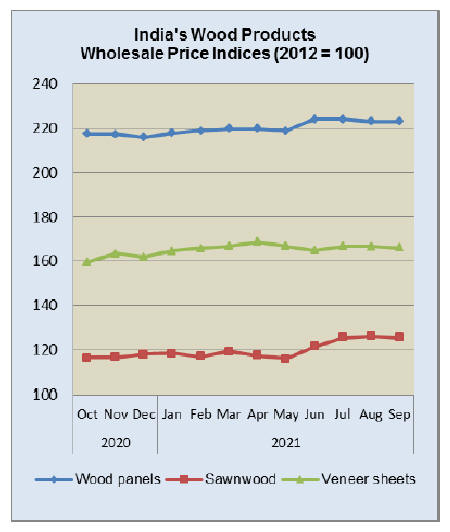
Surging raw material costs
According to Plyreporter wood raw material prices hit an
all-time high in September seriously challenging wood
product manufacturers. Millers report prices for poplar
logs have jumped by around 25% due to supply issues.
Similarly, the price of safeda (Euc.) also increased sharply
in the past six months. Traders say it is unlikely that prices
come down as supplies are limited.
Because of supply issues the industry reports a decline in
capacity utilisation with many smaller units being forced
to stop production. Associations across the country have
warned wholesale prices for finished products will have to
rise.
See:
https://www-plyreporter-com.translate.goog/article/92573/timberprices-cross-1000-big-pain-for-panelproducers?_x_tr_sl=hi&_x_tr_tl=en&_x_tr_hl=en&_x_tr_pto=nui,sc
Housing developments
According to CBRE South Asia Pvt Ltd’s ‘India Market
Monitor – Q3 2021‘ report because of the combination of
an attractive mortgage regime and government incentives
housing sales jumped nearly 46% quarter on quarter to
50,000 units in the third quarter of 2021 and sales
rebounded significantly by approximately 86% year on
year. There was also a 37% rise in project launches on a
quarter on quarter basis. New launches nearly doubled
y-o-y for the year to September 2021.
See:
https://www.cbre.co.in/en/research-reports/Indiainfographic---India-Market-Monitor-Q3-2021
Uneven recovery – informal private sector still in
trouble
Estimates from the National Statistical Division suggest
the informal (unorganised) private sector in India accounts
for over half of the total value added in the economy and
employs over 80% of the total labour force.
India’s GDP in the first quarter of this year was around 9%
lower than in the same quarter pre-pandemic but high
frequency indicators suggest that parts of the economy
have now recovered to pre Covid levels. However, the
impact of policy changes and the pandemic has been felt
more by the unorganised sector. First there was the shock
to this segment following demonetisation and GST then
came covid.
There is debate on whether the various policy initiatives
led to an increase in the pace of formalisation in the
economy but in the absence of data it is difficult to make a
judgement on this.
See:
https://indianexpress.com/article/opinion/editorials/indiaeconomy-coronavirus-pandemic-mnrega-7607868/

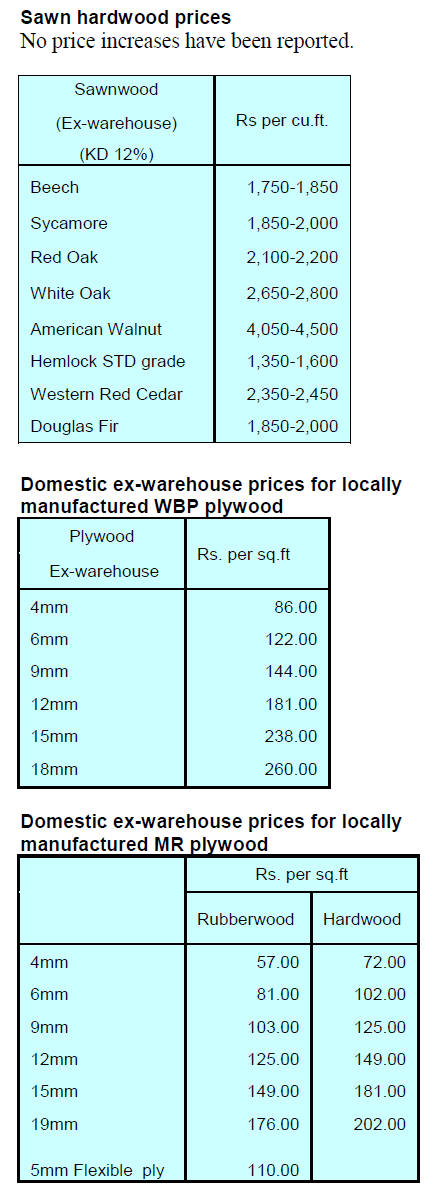
7.
VIETNAM
Covid update
Vietnam had succeeded in keeping the virus under control
for over a year with aggressive contact tracing and
quarantine procedures but has been hit hard by the highly
contagious Delta variant creating a fourth wave of
infections that started in April.
With over 8,000 new COVID-19 cases confirmed mid-
November Vietnam’s total infections rose above 1 million.
This is testing the Vietnamese government’s plan to
reopen the economy.
Highlights of recent trade performance
Vietnam’s W&WP exports to China in October 2021 is
estimated at US$121 million raising the value over the
first 10 months of 2021 to US$1.25 billion, up 25.7%
against the same period in 2020.
Exports of bedroom furniture in October 2021 reached
US$53 million, down 77% compared to October 2020. In
the 10 months of 2021 exports of bed-room furniture
reached US$1.62 billion, up just 1.3% over the same
period in 2020.
According to statistics from Vietnam General Department
of Customs imports of logs from Africa in September
2021 reached 67,870 cu.m worth US$25.29 million, down
23.4% in volume and 23% in value compared to August
2021 and down 16% in volume and 16% in value
compared to September 2020.
In the first 9 months of 2021 wood imports from Africa
reached 757,030 cu.m at a value of US$276.46 million,
down 3.9% in volume and 2.2% in value compared to the
same period in 2020.
Declining imports of tali
Vietnam's imports of tali in October 2021 are estimated at
24,600 cu.m equivalent to US$10.3 million, up 11% in
volume and 11% in value compared to September 2021.
Compared to October 2020, it decreased by 35.7% in
volume and 32% in value.
In general, in 10 months of 2021, the imports of tali wood
are estimated at 321,000 cu.m, worth US$133.2 million,
down 8% in volume and 3% in value compared to the
same period in 2020.
In September 2021 Vietnam imported 22,200 cu.m, worth
US$9.3 million, down 38% in volume and 38% in value
compared to August 2021. Compared to September 2020
importst decreased by 24%in volume and 21% in value.
In the first 9 months of 2021, imports of tali reached
296,300 cu.m, worth US$122.9 million, down 2.5% in
volume and 3.7% in value over the same period in 2020.
Price of imported tali
The CIF price of tali sawn wood imported into Vietnam in
September 2021 averaged US$419.7/cu.m, up 1.2%
compared to August 2021 and up 4% compared to
September 2020.
In the first 9 months of 2021 the mean import price
reached US$414.7/cu.m, up 6.4% over the same period in
2020.
In the first 9 months of 2021, imports of tali logs into
Vietnam amounted to 165,600 cu.m, worth US$65.4
million a year-on-year decline of 10% in volume and 3%
in value.
Imports of tali sawn wood reached 126,800 cu.m worth
US$56.4 million, up 12% in volume and 13% in value
over the same period in 2020.
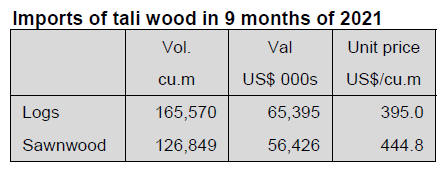
Suppliers
In the first 9 months of 2021, Vietnam's imports of tali
from Cameroon, Congo, China, Thailand decreased
compared to the same period in 2020, while imports from
Gabon, Nigeria, Hong Kong, Laos and Cambodia
increased.
Imports of tali from Cameroon decreased by 10% in
volume and 2% in value compared to the same period in
2020, reaching 204,300 cu.m, worth US$85 million,
accounting for 69% of total imports of this wood.
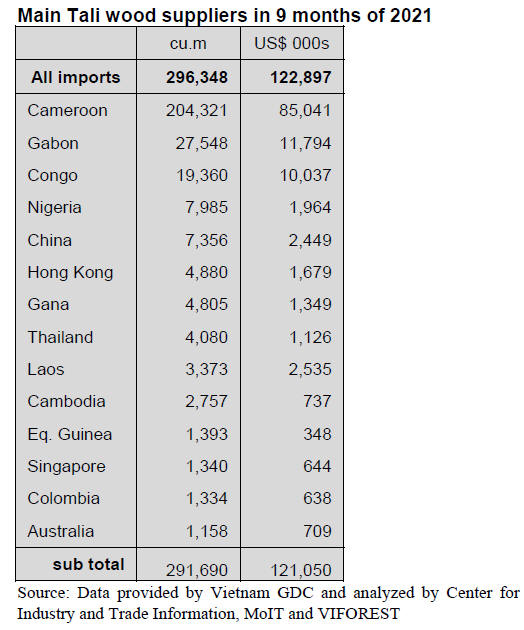
Imports of tali from Congo dropped by 19% in volume
and 10% in value compared to the same period in 2020,
reaching 19,400 cu.m, worth US$10 million.
Imports from China decreased by 8.4% in volume and 6%
in value compared to the same period in 2020, reaching
7,400 cu.m, worth US$2.4 million. In addition, imports of
tali from some other markets decreased against the same
period in 2020, such as from Thailand (-27%); UAE (-
47%); Libya (-29%); Switzerland (-58%) in volume.
In contrast, imports of tali from Gabon increased by 29%
in volume and 18% in value over the same period in 2020,
reaching 27,500 cu.m, worth US$11.8 million, accounting
for 9.3% of total imports.
In addition, imports of tali wood from some other suplliers
increased sharply year-on-year in volume such as Nigeria
(+259%); Hong Kong (+299%); Laos (+297%); Cambodia
(+254%); Colombia (+39%); Angola (+75%); Kenya
(+886%).
Vietnam's wood imports from Africa declined
According to statistics provided by the Vietnam General
Department of Customs imports of wood raw materials
from Africa in September 2021 reached 67,870 cu.m with
a value of US$25.29 million, down 23% in volume and
23% in value compared to August 2021 and by 16% in
volume and 16% in value compared to September 2020.
In the first 9 months of 2021 wood imports from Africa
reached 757,030 cu.m with a value of US$276,46 million,
down 4% in volume and 2% in value over the same period
in 2020.
Wood imports from African shippers are still associated
with risks of illegality. TRAFFIC and the Vietnam
Administration of Forestry provided Customs and Forest
Protection officials with the most up-to-date information
and identification skills through a series of training
sessions and a comprehensive guidance manual.
See:
https://www.traffic.org/news/vietnamese-authoritiesteamed-up-with-traffic-to-tackle-destructive-illegal-trade-ofafrican-timber-species/
African suppliers
In September 2021 imports of wood from various sources
in Africa dropped sharply compared to August 2021 and
September 2020.
Cameroon remained the top supplier of wood raw
materials to Vietnam in September 2021 reaching 29,240
cu.m at a value of US$12.75 million, down 39% in volume
and 35% in value compared to August 2021 and decreased
by 35% in volume and 33% in value compared to
September 2020.
In the first 9 months of 2021 wood imports from
Cameroon amounted to 348,400 cu.m at a value of
US$146,33 million, down 19% in volume and 13% in
value compared to the same period in 2020.
In contrast to the above-mentioned suppliers imports of
wood from Angola in September 2021 reached 6,760 cu.m
at a value of US$2,11 million, up 354% in volume and
434% in value compared to August. In the first 9 months
of 2021 wood imports from Angola reached 55,200 cu.m
at a value of US$14,23 million, up by 137% in volume and
191% in value over the same period in 2020.
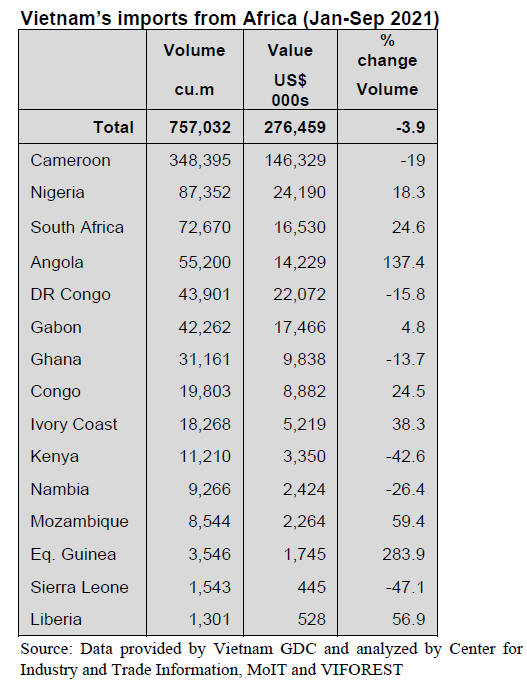
Log imports from Africa
In September 2021 imports of logs from Africa to Vietnam
reached 44,630 cu.m worth US$16.97 million, down 25%
in volume and 23% in value compared to August 2021 and
down 15% in volume and 8.5% in value compared to
September 2020.
In the first 9 months of 2021 log imports from Africa
reached 443,860 cu.m, worth US$62.20 million, down
13% in volume and 9% in value compared to the same
period in 2020.
In the first 9 months of 2021, imports of tali log reached
158,790 cu.m at a value of US$62,45 million, down 15%
in volume and 8% in value compared to the same period in
2020.
Sawnwood imports from Africa
In September 2021 sawnwood imports from Africa
accounted for 23,000 cu.m with a value of US$8,03
million, down 21% in volume and 26% in value compared
to August 2021 and down 20% in volume and 29% in
value compared to September 2020.
In the first 9 months of 2021, sawnwood imports from
Africa reached 311,580 cu.m worth US$113,19 million, an
increase of 11.3% in volume and 9% in value compared to
the same period in 2020.
In September 2021, imports of sawn tali from Africa
decreased sharply compared to August 2021 and
September 2020.
However, in the first 9 months of this year imports of
sawn tali increased by 16% in volume and 16% in value
compared to the same period in 2020 reaching 108,650
cu.m with the value of US$48,73 million.
Year end rise in exports to US expected
In spite of the pandemic Vietnam’s W&WP exports to the
US in October 2021 reached US$400 million, up 14%
compared to September 2021 but down 51% compared to
October 2020.
In general, over the first 10 months of 2021 the W&WP
exports to the US amounted to US$7.1 billion, up 27%
over the same period in 2020.
For the US market wooden furniture accounted for almost
90% of the total export earnings in the first 9 months of
2021 (US$5.9 billion, up 41% over the same period in
2020).
Despite the pandemic most categories of wooden
furniture recorded gains in the first nine months of 2021.
Exports of wooden seats generated US$2.2 billion, up
69% over the same period in 2020 followed by guest and
diningroom furniture at US$1.7 billion, up 31%; bedroom
furniture at US$1.3 billion, up 20%.
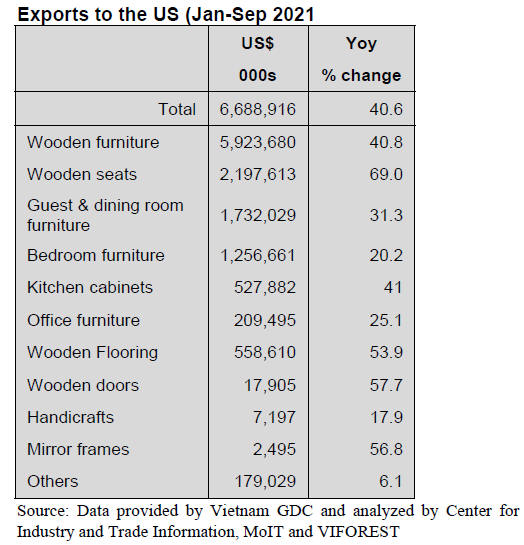
Vietnam's W&WP exports to the US have declined in
the
past 3 months due to the impact of the Covid-19
pandemic. From October 2021, however wood product
exports gradually recovered.
In the last 2 months of 2021 W&WP exports are expected
to surge to meet the high demand in the US.
In the first 8 months of 2021 imports of wooden furniture
into the US from all sources reached US$16,9 billion, up
54% against the same period in 2020.
Vietnam has emerged as the largest supplier of wooden
furniture to the US shipping goods worth US$6.8 billion,
up 73% over the same period in 2020 and contributing
41% of the total value of wooden furniture imported into
the US.
Wooden seats, guest-room, dining-room and bed-room
furniture are the top wooden products Vietnam has been
exporting to US.
With the agreement of the two governments to end the
USTR investigation of Vietnam’s wood imports exports of
wooden furniture made in Vietnam to the US are expected
to increase in the years to come.
See:
https://en.vietnamplus.vn/good-prospects-for-wood-sectorsrecovery-experts/210061.vnp
8. BRAZIL
Cooperation to combat Amazon
deforestation
The National Council for the Amazon aims to coordinate
the government's actions to combat deforestation and fires
in the Amazon Region. At a meeting of the Amazon
Cooperation Treaty Organization (ACTO) the Amazon
Council emphasised that monitoring systems and decisionmaking
support are being improved in addition to the
strengthening of environmental and land regulariation
programmes.
It was also pointed out that in order to fight against
environmental crimes there was improvement in
monitoring systems, new inspectors were hired for
environmental control agencies and there was increased
engagement of public security forces such as the Federal
Police and the National Force. These measures aim to
reverse the course of rising deforestation observed in early
2021.
The Amazon Council restated its commitment to making
ACTO the reference organisation in matters of regional
cooperation, political dialogue on issues on the
international agenda relating to the Amazon.
See:
https://agenciabrasil.ebc.com.br/en/geral/noticia/2021-11/cop26-brazil-supports-intl-declaration-forest-protection
Furniture sector presents good results
Furniture production in Brazil grew 7% in August 2021
(37.6 million pieces) compared to the number produced in
July when the growth was already 9% higher compared to
June. On the other hand, apparent domestic consumption
was 36.2 million pieces in August 2021, an increase of 7%
compared to the previous month. Between January and
August 2021 there was a growth of 9% compared to the
same period of the previous year.
In terms of value the furniture industry earned around
R$8.2 billion in August representing an increase of 9%
over the previous month. For the year to August the
increase was 42%. The average production cost of
furniture was R$219 per piece in August, an increase of
2% over July and 14% for the year to August.
Behind the increased production cost was scarcity of
inputs, rising logistics costs, exchange rates and inflation.
See:
http://www.megamoveleiros.com.br/producao-de-moveisem-agosto-apresentou-volume-similar-aos-bons-numeros-dejaneiro-de-2021/
App will help identify illegal timber logged in Brazil
An app called “Madeira de Lei“ (hardwood) has been
designed to help control and preventthe illegal trade of
high-value timber from the Amazon Region which
currently represent around 13% of Brazilian exports
according to the Federal Police.
The app, which will be used by police officers in Brazil
and abroad, will help the identification of exported timber
allowing the cross-checking of the wood sample with a
database created by the Federal Police. The system relies
on photographic images.
The Federal Police say that illegally harvested or traded
timber identified by the app will not be returned to Brazil.
From now on it will be possible to hold the importer of
illegal timber responsible in the courts of importing
country.
The launch of the “Madeira de Lei” Project was held in
Brasília where diplomats and police officers from several
countries, including the USA, France, Netherlands,
Belgium, Germany, Italy, China, Portugal and also the
United Kingdom participated.
Brazil signs the Forest Deal at COP26
Along with more than one hundred countries Brazil signed
the ‘Forest Deal’ an agreement that intends to eliminate
deforestation in the world by 2030. The agreement is
considered one of the most important within the context of
the 2021 United Nations Conference on Climate Change
(COP26).
Also, Brazil will attempt to achieve zero illegal
deforestation in the country by 2028-30. The plan put
forward by Brazil involves a steady controlled reduction in
forest destruction by 15% per year between 2022 and 2024
increasing to 40% between 2025 and 2026 until reaching
zero deforestation in 2028.
See:
https://www.bbc.com/news/science-environment-59088498
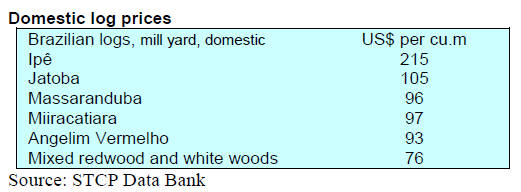
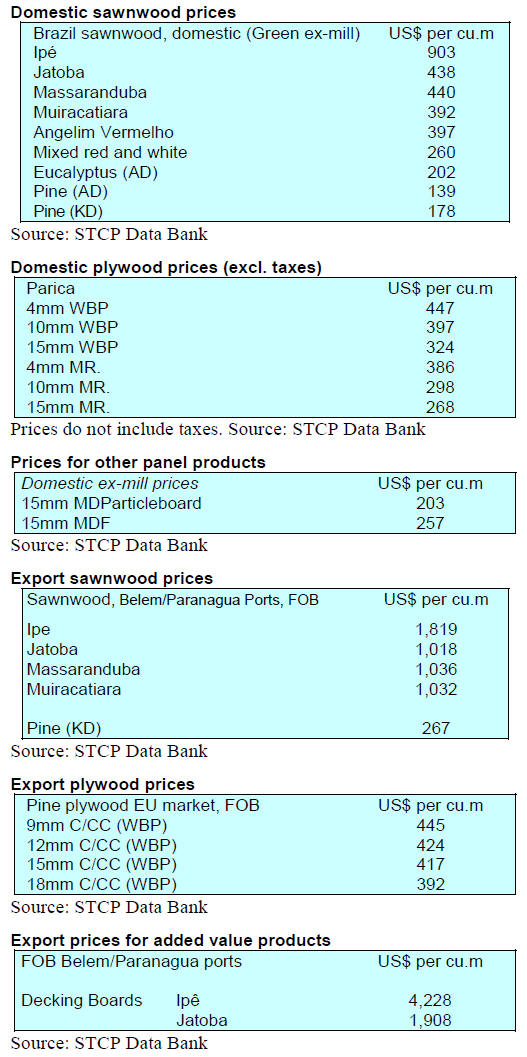
9. PERU
Growth forecast raised again
During a seminar organised by Universidad del Pacifico
the Central Reserve Bank (BCR) Governor, Julio Velarde,
projected that the Peruvian economy would grow around
13% year on year this year thanks to the policies
implemented for a rapid recovery of the country's
production sectors adding "If the production level reached
in August is maintained economic growth this year would
be impressive".
The previous growth projection by the Central Reserve
Bank was 11.9% after having raised it in September from
a level of 10.7%.
See:
https://andina.pe/ingles/noticia-peru-2021-gdp-growthforecast-raised-to-132-869112.aspx
Valuing forests
At a forum “Wood and finishes for sustainability in
construction” organised by the Association of Exporters
(ADEX), the Commission for the Promotion of Exports
and Tourism (PromPerú) and WWF Peru the president of
the Association of Exporters (ADEX), Erik Fischer
Llanos, said the Amazon is an infinite resource of which
the most abundant is wood and that advantage should be
used in a responsible and sustainable way.
The Ambassador of the European Union in Peru, Gaspar
Frontini, commented that in order to take advantage of the
enormous potential of the Peruvian Amazon all the
opportunities for development and social inclusion offered
by the forestry sector must be valued taking account of
sustainable and responsible management of timber
resources so as to avoiding their degradation. For this
reason, he considered it necessary to promote the
sustainable management of wood. However, he was
concerned about the high degree of deforestation.
The Director of PromPerú's Export Promotion Directorate,
Mario Ocharan, highlighted the responsible operations
conducted by ‘formal’ companies in Peru.
Egypt - a potential market for construction products
During a virtual forum "Profile of the construction
materials market in Egypt" Giancarlo Pedraza Ruiz Head
of the consular section of the Peruvian embassy in Egypt
said development of large-scale infrastructure and
numerous urban projects in a population of 105 million
drive the growth of the construction sector in Egypt which
constitutes a great commercial opportunity for Peru’s
wood product exporters.
Products made with Peruvian wood, which are
characterisd by their high quality, durability and optimal
presentation –and environmental certificates would have
an opportunity in Egypt, however, the president of the
ADEX Wood and Wood Industries Committee, Enrique
Toledo Gonzales-Polar, pointed out the importance of
reducing tariff barriers.
Boosting the forestry sector depends on sticking with
forestry legislation
The statement above was the opinion of Javier Rivera,
General Manager of the main reforestation company in the
country. He added the authorities need to understand the
long term nature of planation investments. He said current
government regulations do not encourage reforestation
because such investments will only yield a return in more
than 14 years for exotic species and more than 30 years for
native species (such as cedar and mahogany).
He proposed investors be assured of legal security for 30
to 40 years without which investments by the private
sector will be small.
